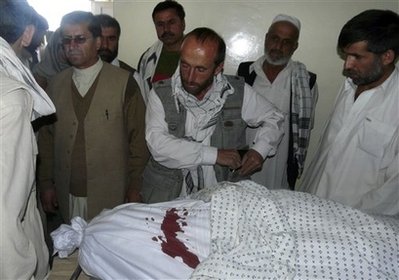
Relatives are seen around the cloth-covered body of Sultan Munadi, a translator for a New York Times reporter, at the hospital in Kunduz, north of Kabul, Afghanistan on Wednesday, Sept. 9, 2009. (Photo: AP)
The military raid to free the British-Irish journalist Stephen Farrell from his Taliban captors was successful in the narrowest possible sense. The rescuers got Mr Farrell out of the hands of his kidnappers in Kunduz, northern Afghanistan. But the raid should be no cause for celebration. Two Afghan civilians are said to have died in the operation. And Mr Farrell's Afghan interpreter, Sultan Munadi, was shot dead, quite possibly by Nato forces.
Much remains hazy about the raid, not least the question of who ordered it. The Ministry of Defence will only say that it was a Nato operation. But the death of a British soldier implies that UK forces were heavily involved. Whatever the truth, the rescue attempt was justified. Independent journalists on the ground in places such as Afghanistan provide a crucial service. When he was taken captive, Mr Farrell was investigating a Nato air raid from last week which appears to have resulted in appalling Afghan civilian casualties. The global public need to know the truth about such incidents and the work of journalists such as Mr Farrell are one of the few routes by which those details emerge. If such news gatherers are kidnapped, governments are surely right to make every effort to secure their release.
But methods matter and so does the human costs of such operations. The uncomfortable impression left by this raid is that Nato forces in the country value the lives of foreigners more than those of Afghans. It also emphasises the broader challenge facing Nato forces. The presence of those forces in Afghanistan might be justified, like the raid to release Mr Farrell. But the way in which they go about their task of pushing back the Taliban risks undermining the objective of stabilising the country. If ordinary Afghans turn against foreign forces because of rising civilian casualties the Nato mission will surely be doomed.
Military commanders need to learn from how this raid went wrong. The episode also underlines what the US commander in Afghanistan, Stanley McChrystal, has been saying about the importance of reducing civilian casualties and providing security for the population. The longer it takes for these lessons to be learned, the smaller the chances of success in Afghanistan become.



